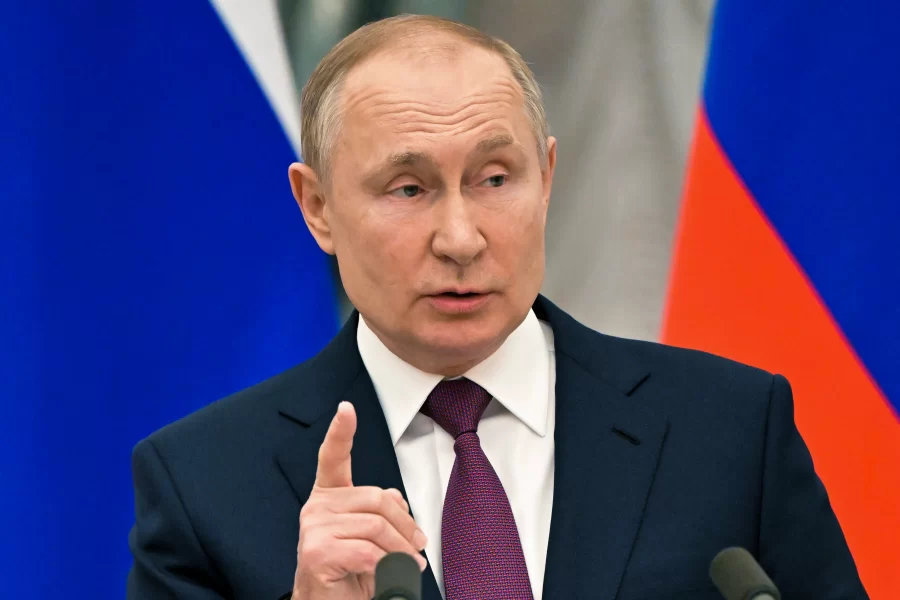The Hypocrisy of Putin’s Nazi Rhetoric
When Russia expanded their invasion of Ukraine in early February, all eyes turned to Putin for his rationale. As manipulative and quick-witted as ever, the Russian president delivered a masterful address in which he managed to shift the blame from his own crimes to the looming presence of NATO, framing inciting a war as a necessary step in the “greater good” of returning Ukraine to its supposed motherland of Russia.
Personally, I found the most notable aspect of the speech was Putin’s constant comparison of contemporary Russo-Ukraine relations to Nazi Germany, and his bold claim accrediting the attacks to his desire for the “de-nazification” of Ukraine.
At the risk of sounding like Trump, painting Ukraine as a country infiltrated with Nazis was a brilliant strategic move on Putin’s end; how could anyone ever oppose the practice of “de-nazifying” a region? However, regardless of the tactical benefits gained by making such a statement, it is simply untrue. Ukraine’s own president, Volodymyr Zelenskyy, is Jewish, so if any former Soviet country has been “nazified,” it is certainly not the one led by a Jew.
Not only do Putin’s falsehoods invalidate Ukraine’s many Jewish communities, but they are entirely contradictory to his complete lack of regard for anti-semitism, exemplified by the recent destruction of Ukrainian Hillel Houses and Jewish Day Schools at the hands of Russian missiles.
Ukraine is home to one of the world’s largest Jewish communities and is the birthplace of many of Judaism’s most important cultures and traditions. During the Holocaust, 1.6 million Ukrainian Jews were murdered, so the 400,000 Jews currently living in Ukraine are only a fraction of their pre-Holocaust numbers. Even so, Ukraine houses a bustling Hasidic community and over 260 buildings affiliated with the Jewish faith.
Even as Putin advocates for the “denazification” of Ukraine, he turns a blind eye to the Neo-Nazi-esque behavior of his own military. Since the war started, several Jewish community centers in Ukraine have been damaged or destroyed, including Babyn Yar, the site of a memorial to Ukrainian Jews executed by Nazis.
Putin’s use of the phrase “denazification” and his contradictory actions which plainly convey his lack of care towards the Jewish community bring light to another concerning trend: the dissociation between Nazism and anti-semitism. Though such a claim may sound nonsensical, it is true and alarmingly prevalent. Take the Capitol insurrection as an example: when pictures of men carrying swastika signs and wearing “Camp Auschwitz” sweatshirts began to circulate, Twitter users urged others to check up on their friends of every marginalized group besides Jews. Nazism is not homophobia or ableism or misogyny. Nazim is white supremacy and anti-semitism.
Don’t get me wrong: the issues faced by women, disabled people, and members of the LGBTQ+ community are completely valid and deserve to be discussed. However, the false conflation of any type of discrimination with Nazism is harmful to the Jewish people, and censors the thousands of years of oppression that we have faced. The corresponding “Jews are White” rhetoric only furthers such erasure of our history.
Overall, the Jewish people kindly ask Putin that he ceases to use us as a ploy in his political game. The destruction of many important Jewish community centers and landmarks throughout Ukraine at his hands has revealed the corruption behind his promises. If Putin is truly committed to “denazification,” I suggest that he start within his own administration.

Arielle is an IB Senior who is very excited for her fourth and final year with The Banner. Outside of The Banner, you can find her telling unfunny jokes...


